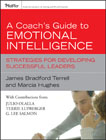
A coach's guide to emotional intelligence: strategies for developing successful leaders
Terrell, James Bradford
The demand for coaching is growing exponentially, driven by a recognition that learning models and practices are not responding to the increasing complexity that defines our times. This book responds to the demand from coaches who understand this complexity and the transformative value of building EI capacity within their clients. It provides a relevant, human scale understanding of howto improve and apply the competencies of social and emotional effectiveness within the coaching setting and rests on a common sense approach of good coaching: integrity, appropriate risk-taking, self-discipline, mutual respect, cooperation and trust. INDICE: Acknowledgments. Introduction. PART ONE: EMOTIONAL INTELLIGENCE ASA FOUNDATION FOR EFFECTIVE COACHING. Chapter One: Connecting Emotional Intelligence and Coaching. Chapter Two: The Business Case for Building Emotional andSocial Effectiveness in Coaching. PART TWO: BUILDING EMOTIONAL AND SOCIAL EFFECTIVENESS PRACTICES IN YOUR CLIENT. Chapter Three: Valuing Self. Chapter Four: Valuing Others. Chapter Five: Responsive Awareness. Chapter Six: Courage. Chapter Seven: Authentic Success. PART THREE: DEVELOPING THE COACH. Chapter Eight: Emotions As a New Field of Learning. Chapter Nine: Developing Your Own Emotional Awareness as a Coach. PART FOUR: CASE STUDIES. Chapter Ten: Coaching to Enhance, Develop, and Strengthen Emotional and Social Competencies in Government Leaders. Chapter Eleven: Case Examples. Conclusion. References. Resources. Index. About the Authors.
- ISBN: 978-0-7879-9735-9
- Editorial: Jossey Bass
- Encuadernacion: Cartoné
- Páginas: 224
- Fecha Publicación: 10/09/2008
- Nº Volúmenes: 1
- Idioma: Inglés
